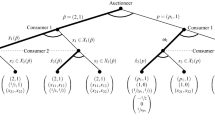Abstract
This article investigates the use of standard econometric models for quantal choice to study equilibria of extensive form games. Players make choices based on a quantal-choice model and assume other players do so as well. We define an agent quantal response equilibrium (AQRE), which applies QRE to the agent normal form of an extensive form game and imposes a statistical version of sequential rationality. We also define a parametric specification, called logit-AQRE, in which quantal-choice probabilities are given by logit response functions. AQRE makes predictions that contradict the invariance principle in systematic ways. We show that these predictions match up with some experimental findings by Schotter et al. (1994) about the play of games that differ only with respect to inessential transformations of the extensive form. The logit-AQRE also implies a unique selection from the set of sequential equilibria in generic extensive form games. We examine data from signaling game experiments by Banks et al. (1994) and Brandts and Holt (1993). We find that the logit-AQRE selection applied to these games succeeds in predicting patterns of behavior observed in these experiments, even when our prediction conflicts with more standard equilibrium refinements, such as the intuitive criterion. We also reexamine data from the McKelvey and Palfrey (1992) centipede experiment and find that the AQRE model can account for behavior that had previously been explained in terms of altruistic behavior.
Similar content being viewed by others
References
Anderson, S., Goeree, J., and Holt, C. (1998). “Rent Seeking with Bounded Rationality: An Analysis of the All Pay Auction.” forthcoming in the Journal of Political Economy.
Banks, J., Camerer, C., and Porter, D. (1994). “Experimental Tests of Nash Refinements in Signaling Games.” Games and Economic Behavior. 6, 1-31.
Brandts, J. and Holt, C.A. (1992). “An Experimental Test of Equilibrium Dominance in Signaling Games.” American Economic Review. 82, 1350-1365.
Brandts, J. and Holt, C.A. (1993). “Adjustment Patterns and Equilibrium Selection in Experimental Signaling Games.” International Journal of Game Theory. 22, 279-302.
Chen, H., Friedman, J.W., and Thisse, J. (1997). “Boundedly Rational Nash Equilibrium: A Probabilistic Choice Approach.” Games and Economic Behavior. 18, 32-54.
Chen, K.-Y. (1994). “The Strategic Behavior of Rational Novices.” Ph.D. dissertation, California Institute of Technology.
Cooper, R., DeJong, D., Forsythe, R., and Ross, T. (1989). “Communication in the Battle of the Sexes Game: Some Experimental Results.” RAND Journal of Economics. 20, 568-587.
Cooper, R., DeJong, D., Forsythe, R., and Ross, T. (1990). “Selection Criteria in Coordination Games: Some Experimental Results.” American Economic Review. 80, 218-233.
Fey, M., McKelvey, R.D., and Palfrey, T.R. (1996). “Experiments on the Constant-Sum Centipede Game.” International Journal of Game Theory. 25, 269-287.
Gale, J., Binmore, K., and Samuelson, L. (1995). “Learning to be Imperfect: The Ultimatum Game.” Games and Economic Behavior. 8, 56-90.
Guillemin, V. and Pollack, A. (1974). Differential Topology. Prentice-Hall.
Harsanyi, J. (1973). “Games with Randomly Disturbed Payoffs.” International Journal of Game Theory. 2, 1-23.
Harsanyi, J. and Selten, R. (1988). A General Theory of Equilibrium Selection in Games. Cambridge, MA: MIT Press.
Kohlberg, E. and Mertens, J.-F. (1986). “On the Strategic Stability of Equilibria.” Econometrica. 54, 1003-1037.
Kreps, D. and Wilson, R. (1982). “Reputation and Imperfect Information.” Journal of Economic Theory. 27, 253-279.
Lopez, G. (1995). “Quantal Response Equilibria for Models of Price Competition.” Ph.D. dissertation, University of Virginia.
Luce, D. (1959). Individual Choice Behavior. New York: Wesley.
McFadden, D. (1974). “Conditional Logit Analysis of Qualitative Choice Behavior.” In P. Zarembka (ed.), Frontiers in Econometrics. New York: Academic Press.
McKelvey, R.D. and Palfrey, T.R. (1992). “An Experimental Study of the Centipede Game.” Econometrica. 60, 803-836.
McKelvey, R.D. and Palfrey, T.R. (1995). “Quantal Response Equilibria in Normal Form Games.” Games and Economic Behavior. 7, 6-38.
McKelvey, R.D. and Palfrey, T.R. (1996). “A Statistical Theory of Equilibrium in Games.” Japanese Economic Review. 47, 186-209.
Partow, J. and Schotter, A. (1993). “Does Game Theory Predict Well for the Wrong Reasons? An Experimental Investigation.” C.V. Starr Center for Applied Economics Working Paper 93-46, New York University.
Rosenthal, R. (1989). “A Bounded-Rationality Approach to the Study of Noncooperative Games.” International Journal of Game Theory. 18, 273-292.
Schotter, A., Weigelt, K., and Wilson, C. (1994). “A Laboratory Investigation of Multiperson Rationality and Presentation Effects.” Games and Economic Behavior. 6, 445-468.
Van Damme, E. (1987). Stability and Perfection of Nash Equilibria Berlin: Springer-Verlag.
Zauner, K. (1993). “Bubbles, Speculation, and a Reconsideration of the Centipede Game Experiment.” Mimeo, University of California at San Diego. Revised as “A Reconsideration of the Centipede Game Experiments”.
Author information
Authors and Affiliations
Additional information
An erratum to this article is available at http://dx.doi.org/10.1007/s10683-015-9471-y.
Rights and permissions
About this article
Cite this article
Mckelvey, R.D., Palfrey, T.R. Quantal Response Equilibria for Extensive Form Games. Experimental Economics 1, 9–41 (1998). https://doi.org/10.1023/A:1009905800005
Issue Date:
DOI: https://doi.org/10.1023/A:1009905800005




